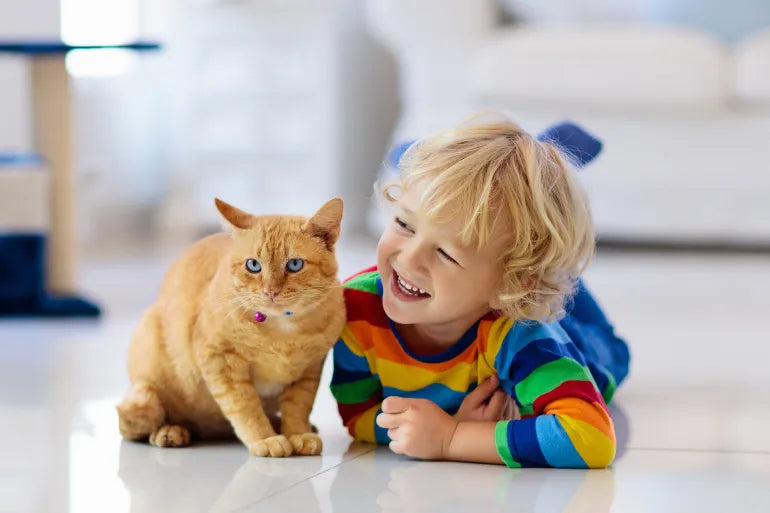






Raising Cats Can Protect Children from Asthma
Raising Cats Can Protect Children from Asthma
Raising cats at home is not just about adding a touch of joy and fun to daily life; it can also have significant health benefits for children, including reducing the risk of asthma. Numerous studies indicate that having cats can enhance respiratory health in children and decrease the likelihood of developing asthma. In this article, we will explore how raising cats can protect children from asthma and highlight the various benefits of this special bond between children and cats.
Strengthening the Immune System
Raising cats can greatly contribute to strengthening the immune system in children. Children who grow up with cats are regularly exposed to various types of harmless bacteria and germs that cats carry. This early exposure can help stimulate and strengthen the immune system, making children's respiratory systems more capable of resisting diseases and allergies. Thanks to this continuous exposure to pathogens, the immune system can become more efficient in combating viruses and bacteria that may cause respiratory illnesses.
Early Exposure to Allergens
Early exposure to cats can help build children's immunity against allergens that may lead to asthma. Studies suggest that children who are exposed to cat dander and fur at a young age tend to have a more resilient immune system capable of handling allergens, thereby reducing the likelihood of developing asthma. This early exposure can diminish excessive allergic reactions that might exacerbate asthma symptoms, thus contributing to maintaining children's respiratory health in the long term.
Improving Indoor Air Quality
Raising cats can motivate families to maintain home cleanliness and indoor air quality. Regularly cleaning cat fur and keeping the house tidy helps reduce the accumulation of dust and mites, which can improve indoor air quality and minimize asthma triggers. By consistently caring for the cat and keeping the environment clean, the amount of allergens in the air can be reduced, creating a healthier environment for children and decreasing the likelihood of asthma attacks.
Psychological and Emotional Support
Cats can provide substantial psychological and emotional support for children, helping to reduce stress and anxiety. Stress and anxiety can trigger or worsen asthma attacks. Having a cat at home can create a calm and comfortable environment for the child, reducing the likelihood of experiencing asthma attacks. Daily interactions with the cat can give children a sense of security and comfort, serving as a natural remedy to alleviate psychological pressures that might affect their overall health.
Encouraging Physical Activity
Playing with a cat can encourage children to be physically active, which helps improve respiratory and cardiovascular health. Regular physical activity can help reduce the likelihood of developing respiratory illnesses, including asthma. Activities with cats can involve various physical games such as running, chasing, and playing with different toys, enhancing children's physical fitness and keeping them active and energetic.
Enhancing Social Communication Skills
Interacting with cats can help improve social communication skills in children. Through caring for and interacting with the cat, children learn how to communicate and express their emotions. Additionally, the cat can be a common topic for conversation with friends and family, promoting social interaction and developing relationship-building skills. Children who learn how to care for pets can become more empathetic and understanding of others' needs, contributing to their positive character development.
Promoting a Sense of Responsibility
Caring for a cat requires taking on responsibility, which is a valuable lesson for children. Through daily tasks such as feeding the cat and cleaning its space, children learn the importance of commitment and caring for others. These skills can be beneficial in other areas of their lives. Learning how to care for pets can instill values such as patience and dedication in children, enhancing their sense of capability in performing daily tasks and taking on responsibilities independently.
Reducing the Risk of Heart Disease
Some research indicates that raising pets, including cats, can contribute to reducing the risk of heart disease. Regular interaction with pets can help lower blood pressure and cholesterol levels, promoting heart health. Having a pet can also help relieve stress and improve psychological well-being, positively affecting cardiovascular health overall.
Conclusion
In conclusion, raising cats at home can offer numerous health benefits for children, including reducing the risk of asthma. From strengthening the immune system and early exposure to allergens to improving indoor air quality and providing psychological and emotional support, cats offer many health benefits that can protect your child from asthma and enhance their overall well-being. Therefore, if you are considering adding a pet to your family, cats might be an excellent option to consider, not only because they bring joy to daily life but also because they offer significant health benefits that support the healthy growth and development of children.
